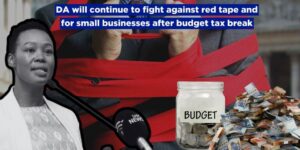Soundbites:
English [Mat Cuthbert]; Afrikaans [Willie Aucamp]; isiXhosa [Luyolo Mphithi]; isiZulu [Karabo Khakhau]; Sesotho [Karabo Khakhau].
- DA launches Bill to replace BEE, with inclusive procurement regime, in the “Economic Inclusion for All Bill”.
- DA calls on the ANC to support this, and put people before cadres.
- 44 million South Africans still stuck in poverty proves that BEE has failed dismally.
Since launching The Democratic Alliance’s Plan to Turbocharge the Economy two months ago, in which we highlighted the key roadblocks to growth and job creation, we now present the Economic Inclusion for All Bill.
This bill aims to replace years of ineffective ANC empowerment policies that have left the majority of South Africans unemployed, impoverished, and hopeless.
Around 44 million South Africans are stuck in poverty, 12 million are stranded in unemployment queues, and our country remains the most unequal place on earth. This is not the inclusive country we envisioned building when we lined up to vote on the 27th of April 1994.
Since the ANC’s BEE policy was first introduced in 2003, conditions have significantly worsened for the people it claims to represent.
The unemployment rate for black South Africans was 36 percent in the last quarter of 2024, compared to 7 percent among white South Africans. From 2014 to 2024, the black unemployment rate increased by 9 percentage points, while the white unemployment rate decreased by 1 percent.
According to the March 2025 Household Affordability Index, approximately 64 percent of black South Africans are living below the upper-bound poverty line of R1,634 per person per month. This means that nearly 30 million Black South Africans are trapped in poverty out of a total population of 52 million.
Instead of redressing the injustices of the past, this policy has created a feeding trough for the ANC’s cadres who have benefited at the expense of the poor and vulnerable.
According to Prof. William Gumede of the Wits School of Governance, “Conservatively, R1 trillion has been moved between under 100 people since 1994. The same people have been empowered and re-empowered over and over”.
He also stated that “South Africa’s BEE model has created a model of corruption because people set up companies just to get a contract.”
Perhaps the most notorious example is the disastrous R54 billion locomotive procurement scandal, investigated by the Zondo Commission into State Capture, which revealed how political connections enabled widespread corruption.
In this case, Transnet unlawfully inflated the price of a 2014 contract to procure 1,064 locomotives from R39 billion to R54 billion to favour Chinese suppliers and channelled over R6 billion in kickbacks to Gupta-linked companies under the pretence of transformation.
The BEE model has become a key driver of corruption within our society. We have witnessed this in the widescale looting of approximately R2 billion from Tembisa Hospital, and the murder of Ekurhuleni Metropolitan Municipality’s Chief Auditor, Mpho Mafole after submitting a scathing report relating to R1.8 billion chemical toilets tender.
This clearly demonstrates how successive ANC administrations have failed to address the root causes of inequality by implementing crude race-based procurement policies to benefit themselves at the expense of the people.
The DA is committed to redressing the injustices of the past by removing all barriers to accessing opportunities and delivering real empowerment for all South Africans.
Our Economic Inclusion for All Bill seeks to amend the Public Procurement Amendment Act of 2024, to repeal all race-based preferential procurement provisions and replace them with a real empowerment system that targets poverty as the proxy for disadvantage instead of race.
This Bill aims to create a public procurement system that encourages genuine economic empowerment by offering incentives for tangible developmental outcomes such as job creation, poverty reduction, skills enhancement, and environmentally sustainable practices.
We aim to reform South Africa’s public procurement framework by aligning it with section 217 of the Constitution, which governs public procurement, requiring that all state organs must contract for goods and services in a system that is fair, equitable, transparent, competitive, and cost-effective.
Our alternative model aligns with the 17 United Nations (UN) Sustainable Development Goals (SDGs), which serve as a universal call to action for government, business, and civil society to end poverty, address inequality and create a path towards sustainable economic growth by 2030.
The Bill removes provisions for set-asides, prequalification criteria, subcontracting conditions, and local content designations, replacing these measures with an outcomes-driven system centred on inclusive development and value-for-money procurement.
Furthermore, the transitional measures in the Bill include the winding down of the BEE Commission over 12 months and the systematic removal of references to BEE across legislation.
To give effect to this change, the Bill empowers the Minister of Trade, Industry and Competition to develop a simplified preference points system based on a supplier’s demonstrated contributions to inclusive development and social impact.
The DA’s alternative scorecard comprises three components. Firstly, Value for Money, secondly, Economic Inclusion, and thirdly, Disqualification Criteria.
The Value for Money component assesses the cost-effectiveness, technical capacity, and reliability of bidders, which accounts for 80 percent.
The Economic Inclusion component assesses bidders’ demonstrable contributions to the SDGs across five different categories, such as Human Development, Economic Empowerment, Environmental Sustainability, Inclusive Communities and Governance, and a Mixed Impact Option, which accounts for 20 percent.
The DA also proposes a Disqualification Criteria to exclude bidders if there is a proven record of fraud, corruption, or misrepresentation.
Instead of granting nominal ownership of foreign and local businesses to ANC cadres, the DA’s alternative aims to empower all South Africans who lack access to economic opportunities by focusing on the following:
- Human Development activities such as feeding schemes, scholarships, and early childhood development.
- Economic Empowerment activities, including local hiring, small business development, and women’s empowerment initiatives.
- Environmental Sustainability projects such as renewable energy, recycling, and reforestation investments.
- Inclusive Community and Governance initiatives like legal aid centres, urban greening, and NGO partnerships.
The DA’s approach to empowerment fundamentally differs from that of the ANC. While the ANC’s policy is only for cadres, the DA’s policy demands no political connections.
Under the ANC, race is the sole criterion, whereas the DA emphasises needs-based empowerment.
The ANC encourages a fronting culture, while the DA promotes social impact and value-for-money in procurement.
The ANC continues to exclude small businesses, whereas the DA considers small businesses vital partners in the fight against unemployment.
While the ANC is preoccupied with increasing red tape and compliance, the DA seeks to reduce red tape, boost social investment, and foster economic growth.
Despite growing evidence of BEE’s failures, the ANC continues to defend it due to their vested interests. One only needs to look at their President and much of the senior leadership to realise this.
That is why the DA is using its position in the Government of National Unity (GNU) and Parliament to oppose this harmful policy and promote genuine empowerment that uplifts the disadvantaged, unlocks opportunities, and delivers prosperity.
The DA may be in coalition with the ANC in government, but that doesn’t mean we need to agree with them all the time. We are in the GNU to represent the interests of all South Africans, and we will not relent.
As a party that cares deeply for our country and its people, it angers us to see how the ANC has used state resources to line its pockets instead of delivering much-needed services and upliftment to the people.
But it doesn’t have to be this way. By strengthening the DA’s hand in government, we can bring good governance to more national departments, deliver services, and create a more prosperous South Africa for all.
Join us in the fight against elite enrichment to promote a policy that aims to redress past injustices, turbocharge our economy, and create jobs.
Achieving economic inclusion for all is within our reach and today marks the start of that journey. So, get behind our Bill and help us dismantle the exclusionary system that has prioritised ANC cadres over the people of our nation.
South Africans deserve better, and under a DA-led national government, they will get it.
It is now incumbent upon the ANC to recognise that its failed policies no longer enjoy the same public support as before. South Africans seek genuine empowerment rather than trickle-down redress.
Therefore, we formally call on the ANC to do the right thing by prioritising the needs of the poor and vulnerable over their cadres.




